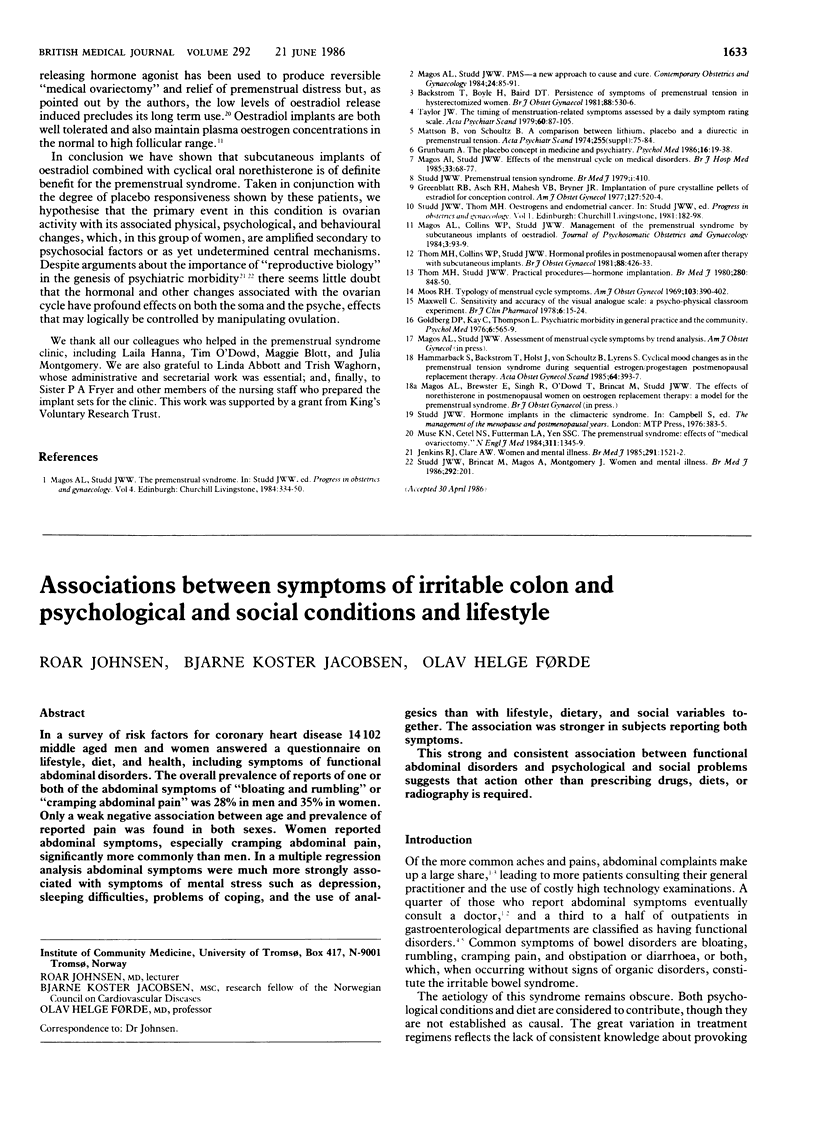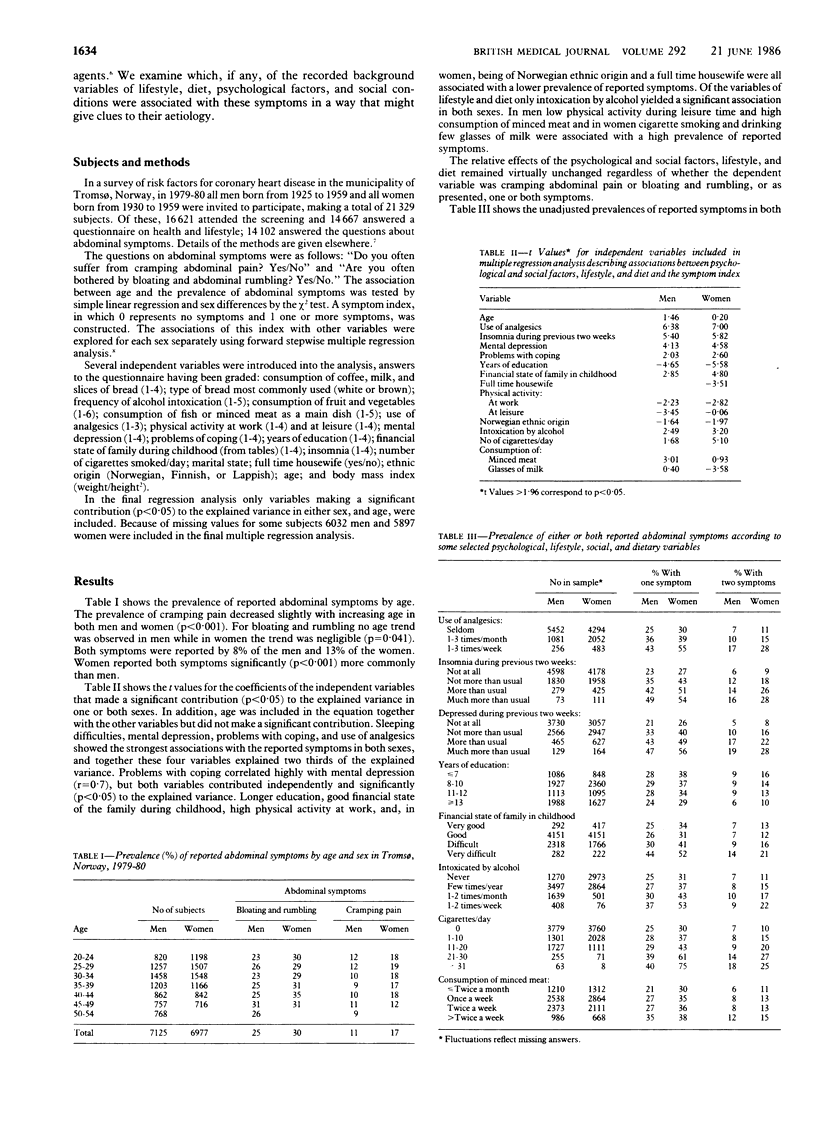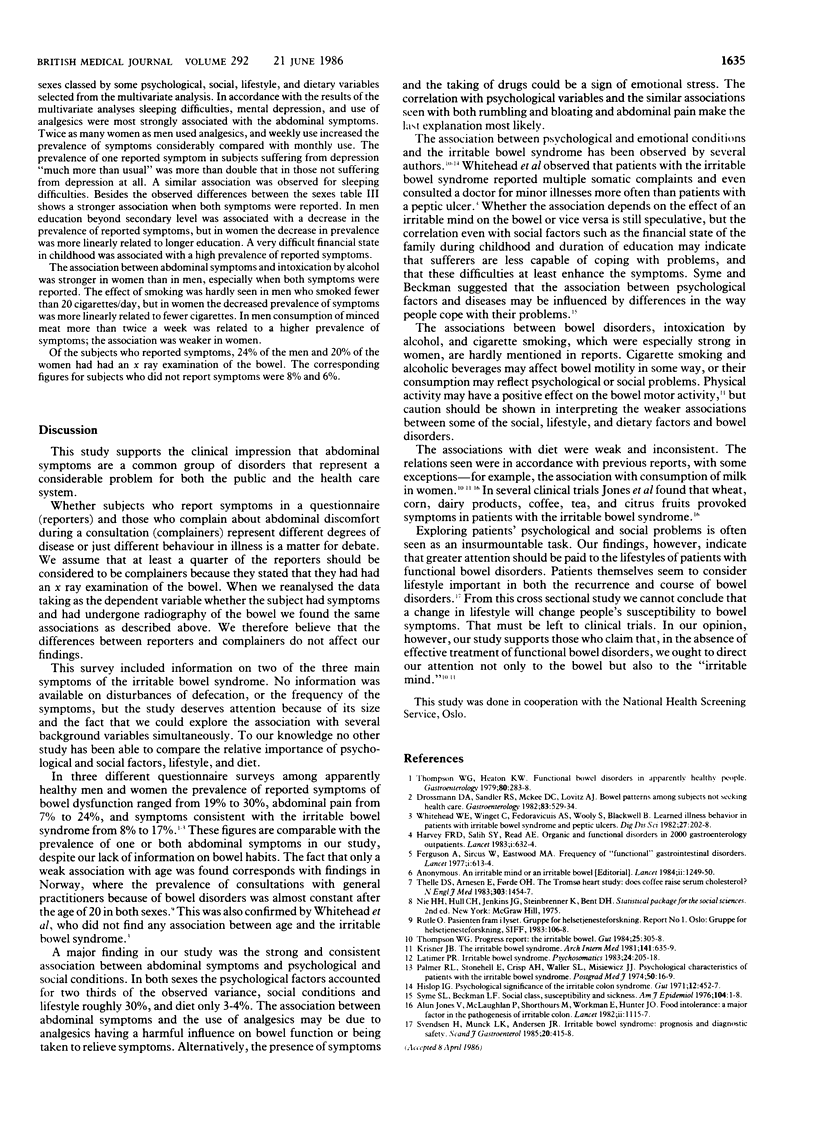Abstract
In a survey of risk factors for coronary heart disease 14 102 middle aged men and women answered a questionnaire on lifestyle, diet, and health, including symptoms of functional abdominal disorders. The overall prevalence of reports of one or both of the abdominal symptoms of "bloating and rumbling" or "cramping abdominal pain" was 28% in men and 35% in women. Only a weak negative association between age and prevalence of reported pain was found in both sexes. Women reported abdominal symptoms, especially cramping abdominal pain, significantly more commonly than men. In a multiple regression analysis abdominal symptoms were much more strongly associated with symptoms of mental stress such as depression, sleeping difficulties, problems of coping, and the use of analgesics than with lifestyle, dietary, and social variables together. The association was stronger in subjects reporting both symptoms. This strong and consistent association between functional abdominal disorders and psychological and social problems suggests that action other than prescribing drugs, diets, or radiography is required.
Full text
PDF


Selected References
These references are in PubMed. This may not be the complete list of references from this article.
- Drossman D. A., Sandler R. S., McKee D. C., Lovitz A. J. Bowel patterns among subjects not seeking health care. Use of a questionnaire to identify a population with bowel dysfunction. Gastroenterology. 1982 Sep;83(3):529–534. [PubMed] [Google Scholar]
- Ferguson A., Sircus W., Eastwood M. A. Frequency of "functional" gastrointestinal disorders. Lancet. 1977 Sep 17;2(8038):613–614. doi: 10.1016/s0140-6736(77)91466-0. [DOI] [PubMed] [Google Scholar]
- Hislop I. G. Psychological significance of the irritable colon syndrome. Gut. 1971 Jun;12(6):452–457. doi: 10.1136/gut.12.6.452. [DOI] [PMC free article] [PubMed] [Google Scholar]
- Jones V. A., McLaughlan P., Shorthouse M., Workman E., Hunter J. O. Food intolerance: a major factor in the pathogenesis of irritable bowel syndrome. Lancet. 1982 Nov 20;2(8308):1115–1117. doi: 10.1016/s0140-6736(82)92782-9. [DOI] [PubMed] [Google Scholar]
- Kirsner J. B. The irritable bowel syndrome. A clinical review and ethical considerations. Arch Intern Med. 1981 Apr;141(5):635–639. doi: 10.1001/archinte.141.5.635. [DOI] [PubMed] [Google Scholar]
- Svendsen J. H., Munck L. K., Andersen J. R. Irritable bowel syndrome--prognosis and diagnostic safety. A 5-year follow-up study. Scand J Gastroenterol. 1985 May;20(4):415–418. doi: 10.3109/00365528509089673. [DOI] [PubMed] [Google Scholar]
- Syme S. L., Berkman L. F. Social class, susceptibility and sickness. Am J Epidemiol. 1976 Jul;104(1):1–8. doi: 10.1093/oxfordjournals.aje.a112268. [DOI] [PubMed] [Google Scholar]
- Thelle D. S., Arnesen E., Førde O. H. The Tromsø heart study. Does coffee raise serum cholesterol? N Engl J Med. 1983 Jun 16;308(24):1454–1457. doi: 10.1056/NEJM198306163082405. [DOI] [PubMed] [Google Scholar]
- Thompson W. G. The irritable bowel. Gut. 1984 Mar;25(3):305–320. doi: 10.1136/gut.25.3.305. [DOI] [PMC free article] [PubMed] [Google Scholar]
- Whitehead W. E., Winget C., Fedoravicius A. S., Wooley S., Blackwell B. Learned illness behavior in patients with irritable bowel syndrome and peptic ulcer. Dig Dis Sci. 1982 Mar;27(3):202–208. doi: 10.1007/BF01296915. [DOI] [PubMed] [Google Scholar]


